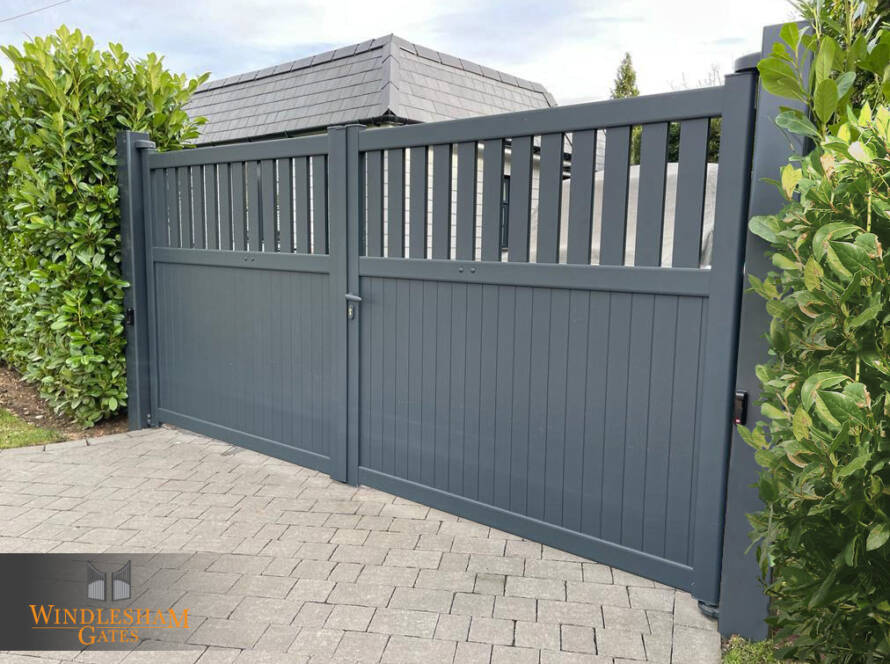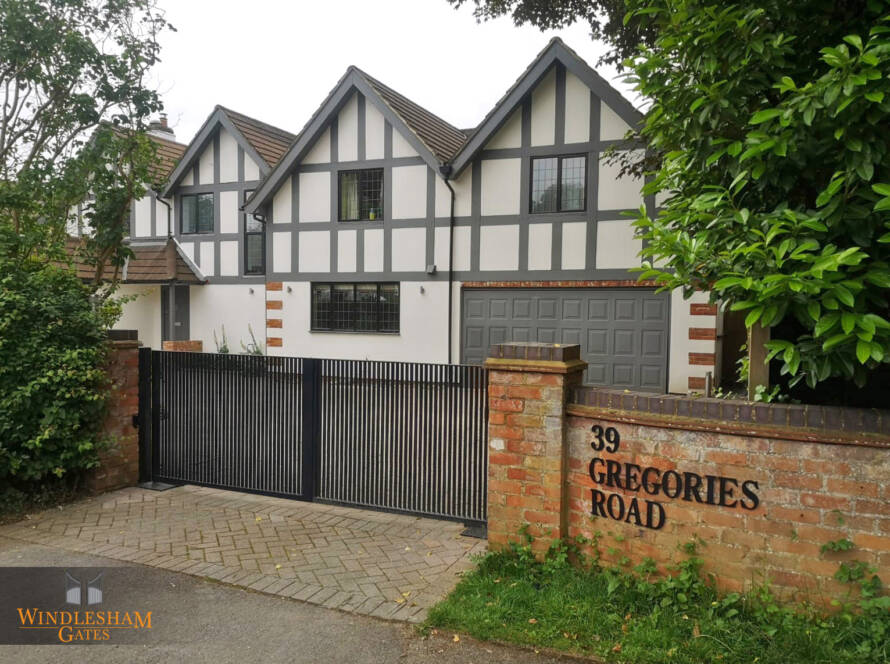When considering electric gates for your property, one of the most significant decisions is the choice of material. The right gate material will not only secure your home but also enhance its style and suit the way you live.
At Windlesham Gates, we specialise in designing, manufacturing, and installing bespoke gate solutions that bring together performance and beauty. Among the most popular requests we receive are for wooden electric gates and aluminium electric gates, both of which come with their own advantages.
Whether you opt for the warmth of wood or the sleek minimalism of aluminium for your driveway gates, your decision will have a lasting impact. After all, a gate is not just a point of entry; it is a feature that defines the first impression of your home, and also a long-term investment in security and convenience.
In this guide, we explore the benefits and considerations of both wooden automatic gates and aluminium gates. With insight from our years of experience, you will be able to make an informed choice that reflects both your property and your priorities.
Aluminium Electric Gates: Style and Performance Combined
Aluminium gates have become the go-to choice for modern homes — and for good reason.
Pros:
- Lightweight but strong: Easier on motors and hinges, which extends system life
- Rust-proof and low maintenance: Unlike steel, aluminium won’t corrode over time
- Contemporary appearance: Clean lines, smooth finishes, perfect for modern builds
- Ideal for sliding mechanisms: Lightweight structure makes them a top choice for aluminium sliding gates
Cons:
- Colder aesthetic: May not suit traditional or heritage homes
- Prone to dents: While durable, they can be more susceptible to impact damage than solid timber
- Fewer “natural” design options: Limited in achieving a truly rustic or organic look
Wooden Electric Gates: Timeless Appeal and Natural Character
If you’re drawn to timeless elegance and natural materials, wooden electric gates still hold strong appeal — particularly for period or countryside properties.
Pros:
- Classic, timeless appearance: Works beautifully with stone, brick, and landscaped surrounds
- Can be tailored for heritage homes: Custom carvings, curves, or traditional shapes
- Sustainable options available: Accoya and other modified woods offer excellent durability
Cons:
- Requires more maintenance: Needs sealing, staining, or painting to maintain appearance
- Heavier: Can place greater strain on motors in wood electric gates for driveways
- May warp over time: Especially in exposed or wet locations, if not properly treated
Cost Comparison
One of the most common queries we receive is: “Are aluminium gates cheaper than wooden electric gates?”
General Pricing (Supply & Installation):
Gate Type | Estimated Cost Range |
Aluminium Sliding Gate | £10,000 + |
Wooden Electric Gate | £11,000+ |
Key Cost Factors:
- Gate size and design complexity
- Type of automation system used
- Site-specific requirements (driveway slope, access)
In general, aluminium electric gates offer better long-term value due to lower maintenance costs, but wooden automatic gates may add more aesthetic value to traditional homes.
Best Use Cases for Each
Aluminium Gates Are Ideal For:
- Modern or minimalist architecture
- Homes in coastal or high-moisture environments
- Properties needing a lightweight gate system
Wooden Gates Are Ideal For:
- Period or heritage homes
- Rural properties or estates
- Clients seeking natural materials and warmth
Customisation Options
Whether you choose timber or aluminium, both materials offer excellent flexibility in terms of style:
Aluminium Gates:
- Powder-coated in any RAL colour
- Horizontal or vertical slats, louvres, or solid panels
- Can replicate the look of timber with wood-effect finishes
Wooden Gates:
- Built using Accoya, oak, cedar, or iroko
- Curved or sculpted tops
- Stained, painted, or left natural
At Windlesham Gates, we create fully bespoke aluminium electric gates and wooden automatic gates, made to order and fitted with automation, access control, and safety systems.
Real Project Examples
Richmond – Aluminium Sliding Gate
A modern villa with limited side space required a low-maintenance gate solution. We installed an aluminium sliding gate with a vertical slat design, powder-coated in anthracite grey. The result was sleek, silent, and secure.
Surrey Hills – Wooden Electric Gates for Driveways
For a listed farmhouse, we built handcrafted wood electric gates in Accoya, finished in a heritage oak stain. The automation was hidden within the brick piers, preserving the traditional look.
FAQs
Q: Are aluminium gates more secure than wooden gates?
A: Both are secure when fitted with quality locks and motors. Aluminium gates are harder to force open due to their rigidity, but wooden gates can be reinforced with steel cores.
Q: Do wooden gates require more maintenance?
A: Yes — expect to reseal or repaint every 2–5 years depending on exposure.
Q: Can I automate a wooden gate?
A: Absolutely. Wooden automatic gates are common, but heavier materials may require stronger motors and hinges.
Q: Can aluminium gates be customised to look like wood?
A: Yes. Many clients opt for wood-effect powder coating for a traditional look with aluminium’s performance benefits.
Need Help Deciding?
Ultimately, the choice between wooden electric gates and aluminium driveway gates is about more than material. It is about how you want your home to look and how you want your gates to perform in the years ahead. Both offer outstanding results when designed and installed by experts.
At Windlesham Gates, we pride ourselves on creating bespoke wooden and aluminium gates that combine security, style, and seamless automation. Our team will work with you from the initial design consultation through to professional installation, ensuring every detail is tailored to your property.
If you are considering upgrading your driveway with aluminium or wooden electric gates, speak to our team today. We will help you explore your options, design a solution that reflects your home’s character, and deliver a gate system that stands the test of time.



